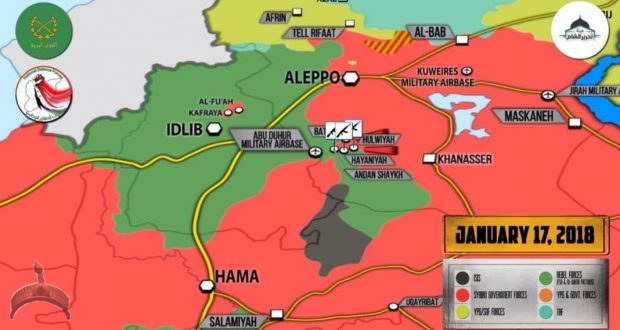by Ollie Richardson Ooduarre via The Saker Blog
Over the past five years my work in the information space has been consciously aimed at explaining why the Russian military does and doesn’t do certain things, whether it be in relation to Ukraine, Yemen, Iraq, Syria, Venezuela, etc, and why demanding that Putin bombs everything in sight is exactly what the CIA wants so-called “pro-Russians” to say. Yet I haven’t exhausted (maybe I never will exhaust it?) this topic because it is so vast and, ultimately, complex. And it is because of this seemingly insurmountable complexity that questions like “Why doesn’t Russia liberate all of Ukraine”, “Why doesn’t Russia save Donetsk and Lugansk in the same way it saved Crimea?”, “Why doesn’t Russia boot America out of Syria?”, etc are asked on social media.
But one statement that I haven’t really addressed (until now) is “Why doesn’t Russia liberate all of Idlib in one fell swoop?”. Many “geniuses” like to say that Putin is in bed with the “Ottoman butcher” Erdogan and has thus “betrayed Syria”, similar to how shaking hands with Netanyahu means that Putin is a Zionist and has “betrayed Syria”, or even that a visit of the Saudi King to Moscow means that Putin has the blood of Yemen on his hands.
So, those “pro-Russian” readers who fear that they may be one step ahead of the Kremlin and can see an iceberg on the horizon needn’t worry – another Putin-esque zugswang is in progress!
When Russia sent its aviation to Hmeymim airbase in Syria in 2015 the primary mission was simple: remove Turkey – the main belligerent – from the game. Ankara benefited from ISIS’ theft of Syrian oil and controlled many jihadist groups on the ground (Ahrar al-Sham being the main one). Then in November 2015 the CIA (via the PM at the time Ahmet Davutoğlu) decided to float a test balloon and see how Russia would react to a carefully designed scenario. A Turkish F-16 shot down a Russian Su-24. It didn’t matter if the Turkish jet was in Syrian airspace or not, as Moscow knew exactly what had happened, and all the other players knew that Moscow knew. The actual murder of one of the ejecting Russian pilots was carried out by a proxy (a Grey Wolf), and not by a Turkish soldier. But in any case, this test miserably failed, because Russia did not react in a way that would contravene international law (the immediate response happened hours after the shootdown – Russian “advisors” and Syrian troops went to Latakia with MLRS and wiped out the “terrorists who were responsible”, who just happened to be Turkmen). Since military operations generally take place within the framework of economic conflicts (securing assets), the manner in which Russia responded to Turkey in the format état-à-état was the equivalent of what the lunatic Zhirinovsky suggested to do, just without the war crimes.
The sanctions on Turkey (aimed at the CIA-Gulen bloc in reality) negated what Ankara was gaining from stealing Syrian oil, and so the Syrian theater became a zero-sum game for Erdogan. In May 2016 Davutoğlu was removed from the picture. Erdogan was forced to take part in the Astana Agreement and start the process of throwing his proxies in Syria under the bus (or onto green buses!) within the framework of what was given the reputation-saving name of “de-escalation zones”.
This was Moscow’s way of countering the game orchestrated by John Kerry, where a pocket in Eastern Syria would magically open (ISIS would go on an offensive) at a time when al-Nusra was on the ropes in Western Syria. This tactic hoped to tire out the Syrian Army and Russian “advisors” and maximise their casualties. Whilst never admitted in public by Moscow (naturally), “de-escalation zones” actually meant “we will liberate Aleppo and thus recapture all of the ‘useful’ (where most people live, in the West) part of Syria, after which the pace of the theater will have been slowed down enough to start work on eliminating the other players”.
After Aleppo was liberated (the Turkish-controlled groups magically withdrew), Russia continued, via the “de-escalation zones”, to whittle down the large list of terrorist groups into two categories: terrorists no longer supported by Turkey (loyal to al-Nusra leader Jolani) and tame terrorists still supported by Turkey. The former category would be shipped to Idlib via green buses, and the latter category would be used to keep the trecherous Kurds and the CIA-Mossad “Rojava” plan at bay.
In parallel to this, the Astana group managed to smash the Gulf bloc into fragments, liquidating their pet terrorist proxies in Syria and forcing them one by one to normalise relations with Assad, since the dollar is becoming a suitcase without a handle.
The question of the S-400 is more complex and isn’t just about defending Turkish skies. It symbolises more a commitment to play by the rules of the newly emerging world order (based on self-defence and international law) and to no longer indulge in the casino known as “Responsibility to Protect” (or in simpler terms – multipolarity vs unipolarity). Similarly, Turkish Stream is another example of Moscow thrusting a lance through the rotting corpse of NATO. In general, Turkey is geographically positioned almost in the center of the battle of superpowers. For Ankara, bearing in mind that the US tried to stage a coup there in 2016 and had a hand in the assasination of Andrey Karlov, the Russian ambassador to Turkey, it is more profitable to look East than it is to look West, and this was why Turkey wasn’t in a hurry to join the EU, since it saw the geopolitical storm brewing on the horizon and wasn’t prepared to kiss the ass of the IMF anymore.
So, returning back to the Syrian timeline, whilst al-Nusra was being herded into Idlib, and since Trump cut aid to US-backed terrorists, Turkey was able to monopolise the “Free Syrian Army” aesthetics (abandoned by the US) and occupy areas of Northern Syria whilst making it look like they are “Syrian rebels” and not Turkish proxies, all for the purpose of preventing the Kurds from travelling any more Westward than they already have. And here is where the array of interests becomes interesting:
- Russia and Iran have basic diplomatic relations with the YPG/SDF (they are Syrian citizens after all) and want them to abandon the US/Tel Aviv/Riyadh;
- The Syrian State wants the YPG/SDF to return to the bosom of the state and hand over the territories they occupy back to the Syrian Army;
- Turkey wants the YPG/SDF removed from the picture/disbanded entirely, but has developed ties with Russia and Iran;
- The YPG/SDF will not negotiate with Turkey unless it can hide behind America’s skirt;
- Formally, Syria views Turkey as an aggressor, although behind the curtain Damascus has a pragmatic consensus with Moscow, which gave Turkey the green light to enter Syria in order to quell Rojava, and which is trying to stabilise the region and include all regional players in the Eurasian bloc;
Yes, it’s complicated. But here is a simple fact that helps the layperson to understand the situation: America has nuclear weapons. This is why Russia cannot stop the US from occupying Northeast Syria (which was plan B, plan A being a replica of Gaddafi’s removal, which failed after Russia cemented the Minsk Agreements in Ukraine). It can squash its proxies that are West of the Euphrates, yes, but it cannot touch US (non-proxy) assets, in the same way that Washington cannot touch Russian (non-proxy) assets. Or rather – they can directly touch each other’s assets, but any “victory” will be completely pyrrhic. From Russia’s perspective, the aim is to make friends with everyone, since the fewer enemies one has, the better.
While the core of the Turkish proxies is busy caging in (so-called “outposts”) al-Nusra militants in Idlib governorate, repelling the Kurds, and occasionally killing US soldiers, a kind of negotiation game between Turkey and Russia is ongoing:
- Turkey needs a terroristified Idlib as leverage against all players but is happy to hand the governorate over to Assad piece by piece in exchange for pieces of the S-400/Turk Stream/general Eurasian bloc project;
- Russia occasionally bombs Idlib in order to exercise its superior leverage over Turkey (the media presents this as “there were talks, but Russia continues to bomb Idlib”), the interim “ceasefire deals” are simply checkpoints in these grand negotiations;
- Turkey turns a blind eye to al-Nusra’s oil operations (which feed their occupation of the governorate);
- As an act of “hybrid war”, Russia and friends assist in the process of assassinating the commanders of al-Nusra in Idlib, since the less leverage Turkey has, the quicker the Idlib circus can end;
- The West broadcasts propaganda about hospitals being bombed simply to cover up the fact that they have been arming and funding Al Qaeda for decades.
The “x-factor” in this conundrum is Trump’s “pull-out”. If US troops pull out of Northeast Syria completely, it would be in Russia’s interests if Turkey filled the void and proverbially herded the Kurds back towards Assad. For America, the sooner this war ends the quicker US troops can return home, but Trump won’t exit without getting something in return. However, there is a big problem – Zionism. Tel Aviv tries to keep America in Syria. Netanyahu didn’t spend all that time begging Uncle Sam to invade Iraq just for him to leave when the going got tough. Moreover, Iraq is already falling into the hands of Iran, and sooner or later the S-400 will be sat in Mesopotamia. Not to mention the fact that Russia is entrenching itself in Lebanon. Did I mention that Trump’s (purposeful?) decisions (and failed “deals of the century”) are strengthening the Palestinian resistance (example)? So what in all honesty does Israel hope to do?
Well, since everything that happened in the Middle East since 2001 (and arguably even earlier) is mainly in Israel’s interests, especially the Syrian war, it’s not a surprise that 8 years of full-scale local proxy warfare has reduced to… Israel taking aerial pot shots at a limited slice of Syrian territory. I have already explained why Russia doesn’t react to these airstrikes in the way that social media guerrillas would like, and all that has happened since is Netanyahu’s election victory. I would only add that bombing Syria became even riskier for Tel Aviv, since the SAA air defence units gain more experience with each new raid. Moscow managed to make a nice gesture to Israel, recovering from Syria the remains of an Israeli soldier missing since the 1982 war in Lebanon, but it wasn’t done for the purpose of stopping the airstrikes. It was simply a typical Russian diplomatic move based on the concept of “violence doesn’t beget violence”. Deflecting Israel’s airstrikes is the job of the Syrian air defences. The Israeli media presents this as “Russia has friendly relations with Israel and knows that Jerusalem considers Iran its leading existential threat, so does not block Israeli strikes at Iranian targets and those of its proxies, but on one condition: Stay out of Russia’s way and give ample warning so there won’t be a repeat of incidents like the one in which Syria shot down a Russian spy plane, possibly because of confusing signals by Israel”. However, in reality Russia wants Syria to become an independent adult, capable of defending itself without requiring Russia’s help, and it is only in this way that Syria will be able to successfully integrate itself into the Eurasian bloc. Of course, logically speaking, if Israel just left Syria alone and minded its own business, then Iranian forces wouldn’t even be in Syria. But I think that most know by now that Israel wanted (and maybe still wants) to carve Syria into 3 pieces along sectarian lines.
Another layer of the Israel problem is the fact that America is standing behind it (and thus the diplomatic support of many banana republics) and an illegal nuclear program, so it’s leverage when compared to Syria’s is superior, hence why the airstrikes happen in the first place. The incident with the downing of the Russian surveillance plane didn’t really change much, because Moscow knows that apartheid Israel is the main troublemaker in the Middle East (and even more so in Ukraine – those who truly understand Ukrainian history will understand why I say this), and the Syrian war coming to an end (whilst strengthening Israel’s neighbours in parallel) is in itself a blow to Tel Aviv.
What is very common to see now is countries seemingly sat on two chairs – the West and Eurasia. For example: Serbia, Turkey, and Saudi Arabia show signs of looking both West and East. What is going on in reality is many tugs of war between superpowers, and the stronger Russia’s military and China’s economy become, the more it tips the scales in their favour, and the more “multipolar” the world becomes. It’s not that the US’ influence in a “converted” country disappears (the creation of NGOs is not illegal, and liberalism as an ideology cannot be physically destroyed), but more that the influence becomes less as the country adjusts to the new global economic reality. Although if Trump is indeed playing 4D chess with the “deep state” and is deliberately de-globalising the planet, then this shrinking of influence may be more fluid and less volatile than it seems.

In summary: Turkey – the driving force behind the Anglo-Israeli proxies in Syria – was forced to abandon its plans in Syria after NATO’s Su-24 shootdown gambit failed; Ankara and Moscow now mutually exchange a piece of Idlib for a piece of S-400; the Syrian war is now at the “exit negotiations” stage, but Israel doesn’t want to be left alone with a stronger Syrian Army, Hezbollah, and Palestinian resistance at its border; Russia isn’t in a hurry to liberate Idlib, since an alternative plan is to let the jihadists kill each other like spiders in a jar, thus the lives of SAA soldiers are not put in danger unnecessarily.
PS I am well aware that Turkey creates local councils, military adminstrations, and civilian infrastructure in North Syria, and I am not an advocate of such behavior but I don’t pretend to be more qualified than the Kremlin when it comes to solving such problems. I doubt that the Kurds would have behaved any different had they succeeded to create “rojava” in the summer of 2016. As for America, just look at what it has done to Raqqa and Mosul. Out of these options, I would prefer a temporary Turkish occupation, knowing that in the near future the situation would improve.
 Ọmọ Oòduà Naija Gist | News From Nigeria | Entertainment gist Nigeria|Networking|News.. Visit for Nigeria breaking news , Nigerian Movies , Naija music , Jobs In Nigeria , Naija News , Nollywood, Gist and more
Ọmọ Oòduà Naija Gist | News From Nigeria | Entertainment gist Nigeria|Networking|News.. Visit for Nigeria breaking news , Nigerian Movies , Naija music , Jobs In Nigeria , Naija News , Nollywood, Gist and more









